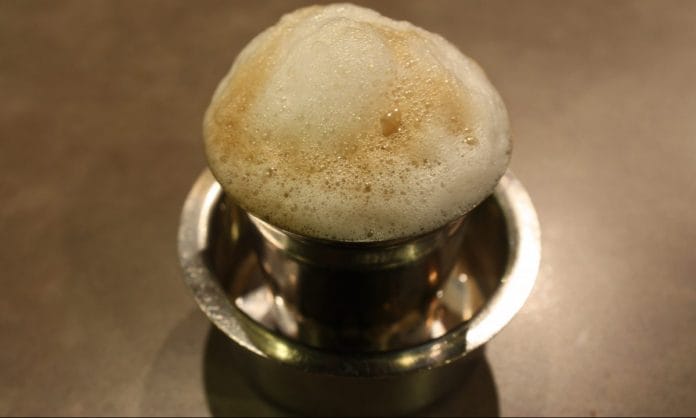New Delhi: After months at number two, India’s filter coffee has finally been ranked the best coffee in the world.
A staple in South Indian homes, filter coffee has now received international acclaim, securing the top spot on TasteAtlas’ list of the ‘top 62 coffees in the world’. It has even surpassed the beloved café Cubano.
“We are extremely happy but one cannot deny that the recognition has come too late,” said Suresh Jayaram, a Bengaluru-based coffee connoisseur.
Despite the mushrooming of Starbucks and Tim Hortons, the essence of Indian coffee culture beats proudly in the humble filter coffee. This frothy, aromatic concoction, brewed in traditional stainless steel tumblers, is more than just a beverage—it’s a cultural icon.
Born in South Indian kitchens, filter coffee is a symbol of hospitality and heritage. Unlike mass-market cappuccinos and lattes, it’s a ritual of patience.
“Getting the proportions just right is everything,” said Jayaram, who is very particular about his coffee. If it doesn’t taste perfect from the first sip, he’s not afraid to leave it untouched and walk away.
Averse to the offerings of large coffee chains, Jayaram prefers traditional brews from local spots like Mavalli Tiffin Room (MTR), Brahmin Cafe, and Bharathi Refreshments. Outside Tamil Nadu and South Karnataka, though, he happily switches to tea.
“Coffee isn’t a cakewalk. You cannot cut corners,” Jayaram explained.
“Quality of coffee powder, the decoction you prepare, the heat of the milk, and proportion of the two—every step contributes to that perfect cup of filter coffee.”
‘Filter coffee isn’t cool’
Raised in the Andaman Islands, chef Dhruv Oberoi was influenced by the flavours of South Indian culture in his childhood. His neighbours would often spoil him with puttu, Kerala bananas, jaggery, and, of course, filter coffee.
Oberoi has been leading kitchens in Delhi for the past decade, but he still finds himself yearning for that perfect cup of coffee that just doesn’t quite taste the same up north.
While places like Saravana Bhavan and Carnatic Cafe have certainly brought authentic South Indian flavours to the capital, there is something about Bengaluru’s filter coffee that still reigns supreme.
“Bengaluru coffee is much toastier and nuttier, while Delhi serves bland, less frothy, sometimes too bitter coffee,” said Oberoi, who serves as the executive chef at Olive Bar & Kitchen.
According to the chef, Indians lack confidence when it comes to showcasing their local beverages on the global stage. From kanji and kokum to chaach and filter coffee, desi drinks haven’t been promoted internationally because there’s a fear they might “downgrade the menu”.
As Oberoi puts it, the common mindset is: “A cappuccino is cool, but filter coffee isn’t.”
He also points out that part of the problem lies in filter coffee’s complexity and the skill required to master it, which makes it harder to bring to the global forefront.
That said, there’s one restaurant chain that has successfully taken its filter coffee global without compromising on authenticity: MTR.
Also read: Girish Karnad to Sai Paranjpye, why Indian icons have donated to Ashoka University’s archive
Coffee ethics at MTR
Today, there’s an MTR in Singapore, Kuala Lumpur, Seattle, London, Bellevue, and Dubai. The restaurant, running in its 100th year, will soon have an outpost in Toronto as well.
But the expansion plans are tempered with caution—the family’s time-tested secret recipes cannot be compromised.
“We source our beans and do the roasting at our factory in Bengaluru. And export the roasted beans to our franchises across the world,” said 50-year-old Vikram Maiya, who is managing director of the restaurant chain along with his sister Hemamalini and brother Arvind.
Maiya is against the idea of exporting coffee powder. “It loses the aroma,” he said.
However, his responsibility doesn’t end there. During their training, MTR’s chefs are taught every step that leads to the restaurant’s famous hot cuppa.
Then there are certain rules MTRs swear by.
The choice of beans has to be Arabica. Only 250 ml of decoction is prepared in one batch. And it has to be used within an hour.
“It loses its flavour, tastes sour, and a bunch of chemical reactions also happen that downgrade the quality,” Maiya said.
Also read: What’s your image of Europeans in colonial Calcutta? Think beyond mansions & clubs
French press vs traditional
To keep up with the hustle of daily life, many turn to a French press for an instant cup of filter coffee.
But coffee lovers like Chetan Hegde, Bengaluru chapter head of the National Restaurant Association of India, don’t love the idea. Even though the traditional method is a slow process, it creates a difference in decoction, like slow cooking.
“It’s a drink that reflects both the patience and the precision of its preparation,” said Hegde, who drops by the Central Tiffin Room for a quick Mangalore Bajji with a hot cup of filter coffee.
Hegde pointed out that people outside India may not be familiar with the method, but for those who have experienced it, “the slow-brewed, thick, and aromatic decoction is quite different from the more well-known espresso-based drinks or even traditional drip coffee.”
The preparation of filter coffee, according to Hegde, varies across South India, with each region tailoring the strength, type of beans, and proportion of chicory to suit local tastes.
“The cultural significance is also key—particularly in Karnataka, where serving filter coffee to guests is a symbol of respect.”
The Malnad region—a lush, hilly expanse straddling Karnataka and Tamil Nadu—is home to what Maiya calls the “finest arabica beans.”
However, the supply still can’t keep up with the growing demand. The production cannot serve the northern belt, let alone globally.
“To experience great coffee, one has to come to the South,” he says, noting how coffee tourism is practically nonexistent in India.
“Wine tasting is all the rage, but have you ever heard of coffee tasting?” he said. “It’s still in its infancy here. Maybe one day, it will become a big thing.”
(Edited by Prasanna Bachchhav)






